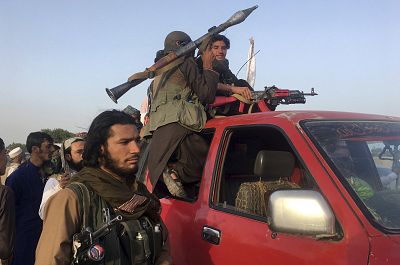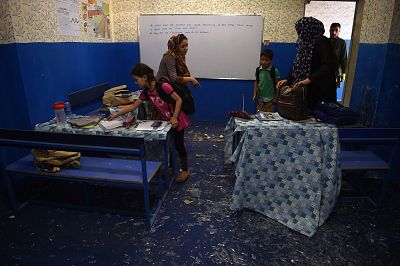"We have to end this conflict — how long we can continue and sacrifice sons of this nation?"
KABUL — America's longest war may yet be inching towards a conclusion.
Earlier this week, senior Taliban officials and Afghan notables issued a "road map to peace" after two days of talks in Doha, Qatar. Within hours, U.S. diplomats resumed talks with the fundamentalist fighters. Soon after, the U.S. envoy for Afghan reconciliation, Zalmay Khalilzad, was jetting to China ahead of a trip to Washington to report and consult on the process.
Khalilzad said the latest round of U.S.-Taliban talks, which began on June 29, has been the "most productive session" since they first started last year. At best, these talks represent the first steps toward ending the war, but withdrawing U.S. troops would not guarantee an end to the fighting between the militants and Afghan government.
An end to decades of violence could not come soon enough for Qudratullah Zaki, a former member of Parliament who says he survived a Taliban attack on March 7, 2018, but is nonetheless eager to make peace with his attackers.
"About 200 Afghans are dying every day in this conflict — as civilians, security forces and also the Taliban," he told NBC News. "We have to end this conflict — how long we can continue and sacrifice sons of this nation?"
The attack that almost killed Zaki is part of a web of violence that has afflicted the nation for decades. Since 2001 when the Taliban was toppled after sheltering 9/11 mastermind Osama bin Laden, tens of thousands of civilians and security personnel, as well as more than 2,400 Americans, have been killed in Afghanistan.
The militants currently control or contest more of the country than they have since being toppled.
So while there is a deep thirst for peace in Afghanistan, many fear the talks between the U.S. and the Taliban will not halt the conflict but merely see the end of American involvement. And even if a possible U.S.-Taliban deal turns out to be a first step to peace, women and ethnic minorities in the country wonder what peace with the Taliban would look like.
Laila Haidari, the founder of an organization that aims to empower Afghan women, said she was worried about the agreement's pledge to uphold women's rights "within the Islamic framework."
"Right now we can do business, we can get an education, have financial freedom," said Haidari, who like many other activists fears that progress made since the end of Taliban rule, such as ensuring that many girls can go to school and some women work, is in jeopardy. "I run a business and a charity. According to the 'Islamic framework,' would I be able to do what I'm doing?"
The Taliban violently enforce their strict and austere version of Shariah law in areas they control, and when they ruled the country they prevented women and girls from going to school or working outside the home.
News
Heather Barr, acting co-director of the women's rights division at New York-headquartered Human Rights Watch, warned that women and girls could see tenuous gains of the last 18 years threatened by an empowered Taliban.
"The Taliban remain fundamentally opposed to gender equality," she said. "There is a particular risk that the U.S. is now in such a rush to reach a deal that they will be quick to minimize or ignore risks to women's rights in this process."
While Taliban leaders now insist they have reformed and will not discriminate against women, as well as ethnic and religious minorities, they privately appear to confirm some of Haidari's fears.
Protecting women's rights "doesn't mean we would allow women to work in offices like they are doing today," said one commander based in Helmand province who spoke to NBC News on condition of anonymity because he is not authorized to talk to the media.
Secretary of State Mike Pompeo has warned that future U.S. assistance to Afghanistan could depend on the country's treatment of women and minorities. Still, analysts and experts agree that the U.S. priority is to make sure the country is never again a launchpad for international terrorism, as well as the orderly withdrawal of most of its some 15,000 troops.
Other terms of a Taliban-U.S. agreement could include a ceasefire and the start of peace talks between the Taliban and Afghan government, former U.S. officials, foreign diplomats and regional experts have told NBC News.
News
The Taliban confirmed they met with the U.S. on Tuesday and said both sides would now take a break to discuss the outcome of talks with their respective leaderships, according to the Taliban's spokesman in Qatar, Suhail Shaheen.
Taliban officials tell NBC News they believe U.S. envoy Khalilzad went to China to seek its role as a possible guarantor if an agreement is reached between the U.S. and Taliban.
Despite momentum in talks, there is a long way to go to see an end to fighting.
The Taliban has so far refused to meet with the government of President Ashraf Ghani, which the group views as a puppet of the West.
Meanwhile, members of the Taliban say they have themselves been sidelined from talks and several field commanders had refused to agree with the joint statement issued after the intra-Afghan conference, three Taliban officials told NBC News on the condition of anonymity.
"This is neither a statement of the Islamic Emirate of Afghanistan nor Taliban leadership," said the commander in Helmand, referring to the "road map to peace."
"Nobody is bound to follow it," he added.
Ahmed Mengli reported from Kabul; Mushtaq Yusufzai from Peshawar, Pakistan; Saphora Smith from London; Dan DeLuce and Abigail Williams from Washington.













